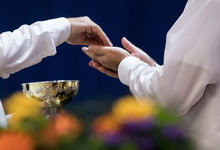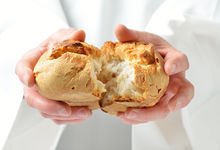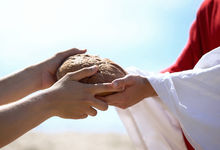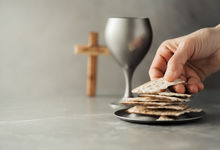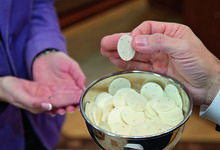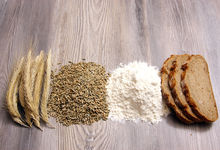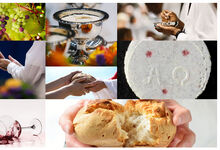The sacraments (23): The Lord’s bountiful table
The New Testament says little about how, but all the more about why and what for. So how does the Bible interpret Holy Communion? Here is a look at the words of the one who instituted it, Jesus Christ.

“This is my body…”
The Greek term soma does not only mean “body” but also “organism”, the whole human being. Everything that Jesus is, is sketched out in the previous sentence: “He took bread, gave thanks and broke it, and gave it to them”, basically a summary of Jesus’ life: He took on flesh, which was broken and given into death. Holy Communion celebrates the incarnation of God.
The body of Christ is also the church of those who are baptised in Him. It is a matter of fellowship, not only of coming together, but actually of coming together to be together. Apostle Paul makes this clear when he gives the Corinthians a piece of his mind because they did not look out for each other when celebrating the Lord’s Supper. Holy Communion celebrates the intimate fellowship of the congregation and its Lord.
“…which is given for you.”
Sometimes it means “give”, sometimes “to give over something to someone”, or even “betray”. When Jesus told His disciples about His future or Judas Iscariot was branded as a traitor, the basic text speaks of paradidomi. This is the intensified form of “giving”. Holy Communion celebrates the ultimate surrender of Jesus Christ.
“This is my blood…”
Mark and Matthew cite the words of Moses here when he sprinkled the blood of the sacrificial animals on the people as a sign of God’s covenant with Israel. Paul and Luke, on the other hand, speak of a new covenant, as announced by the prophet Jeremiah. Either way, Holy Communion celebrates God’s covenant with man.
“…which is shed for you…”
Again it says “for you”. Jesus does not act for His own benefit, but to serve humankind. This is a reference to Isaiah’s prophecy of the substitutionary suffering of the Servant of God, who gave His life as “an offering for sin”. Holy Communion celebrates the sacrifice of Jesus Christ.
“…for the forgiveness of sins.”
Matthew is the only one who makes this so clear. But the blood of the sacrifice of atonement and the suffering of the Servant of God leave no doubt that this is also what the three other biblical witnesses mean: Holy Communion celebrates Jesus Christ’s act of redemption.
“Do this in remembrance of Me.”
Paul and Luke are the only ones who convey the command of Jesus to repeat His actions. According to Acts, already the early church in Jerusalem practised the breaking of bread and was steadfast in it—the early form of Holy Communion. Holy Communion celebrates the past with Jesus Christ.
“For as often as… you proclaim the Lord’s death…”
Proclaim (katangello) is not a silent and introverted kind of remembrance, but a loud declaration. And this does not happen in the past, but with every repetition, over and over again in the here and now. Holy Communion celebrates our profession of faith in Jesus Christ and His presence.
“…till He comes.”
Paul is the only one who makes reference to the return of Christ, but the three Evangelists go even a little further and set their sights on the future kingdom of God by citing Jesus’ vow to abstain from wine (“I will not drink of this fruit of the vine until that day when I drink it new with you in My Father’s kingdom.”). Holy Communion celebrates the future with Jesus Christ.
“Whoever eats My flesh and drinks My blood…”
The gospel of John does not report on the Last Supper as such, but nowhere else does it become so drastically clear just how indispensable Holy Communion is: only he who “chews” His flesh, so the literal translation, “has eternal life, and I will raise him up at the last day”. Holy Communion celebrates the eternal redemption in Jesus Christ.
This already suggests a concept of sacrament, which the Church Fathers came to define only later. Before that the celebration of Holy Communion gave rise to Christian worship and divine service. This is what we will explore in the upcoming parts of this series.



